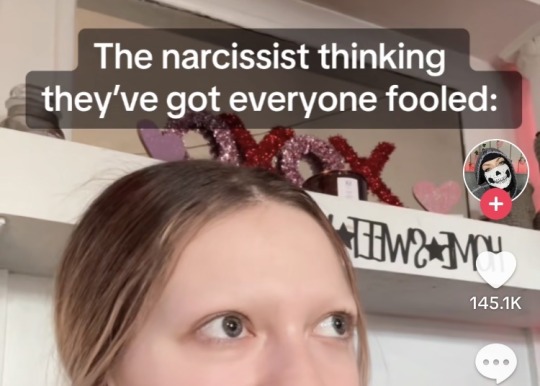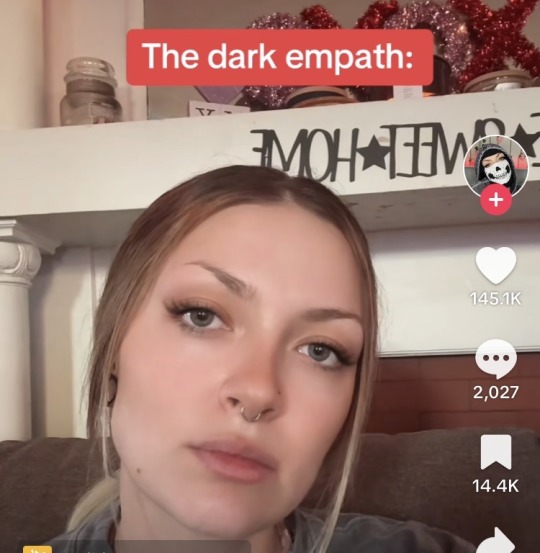Text
No, cause hear me out-
The Hatchetfield High mascot is Zeke the Fighting Nighthawk, right?
And the nighthawk who speaks for the flock in Perky's Buds is named Ezekiel
Am...am I onto something here???
219 notes
·
View notes
Text
the thing about the hatchetfield characters is that professor hidgens is always one bad day away from becoming a murderer and grace chasity is always one good day away from becoming a murderer
4K notes
·
View notes
Text

I’mma sing you a sacred psalm
On your knees, pray along…
—
We did a Hatchetfield marathon recently and my decade-long on-again off-again Starkid obsession came ROARING back!! Grace Chasity was designed to appeal to everything I love to paint, so naturally here I am ✨
5K notes
·
View notes
Text
Starkid is one of the absolute best arguments for supprting independent art. The fact that the shows you're invested in can't get canceled by Big Daddy Streaming, the quality is always amazing, the love of the cast and crew doesn't get squeezed out by surprise budget reductions, the fact that since crowd funding provides almost all costs up front (plus the presence of voluntary digital ticket/in person tickets for additional funding), the fan base can access the full material for whatever cost they can contribute (even if you can give nothing monetarily, you will still get a professionally shot version of the material eventually, without surprise fees or password crackdowns, AND with captions/completely accesible regardless of location). The same goes for Tin Can Bros, Shipwrecked, and all the other associated theater and web series companies loosely connected to Starkid. Like, I cannot believe the amazing content provided to us at the same level as Broadway or streaming services with billion dollars at hand, with almost none of the catches that come with others. Like, I cannot believe that we get all of this right at our hands.
7K notes
·
View notes
Text
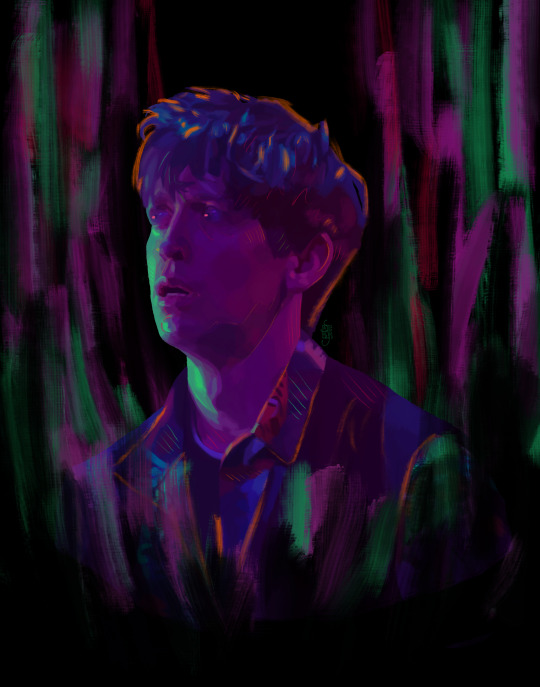
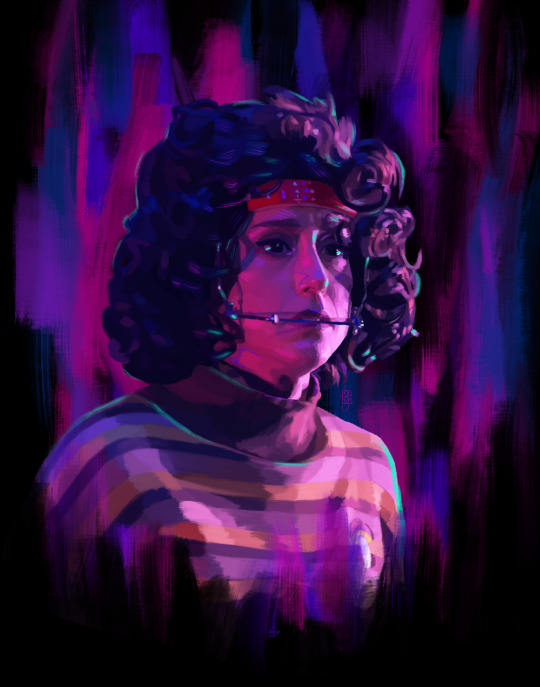
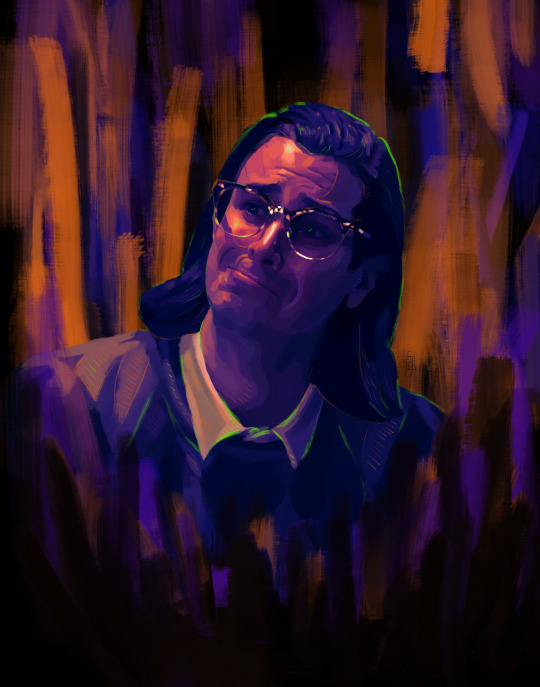
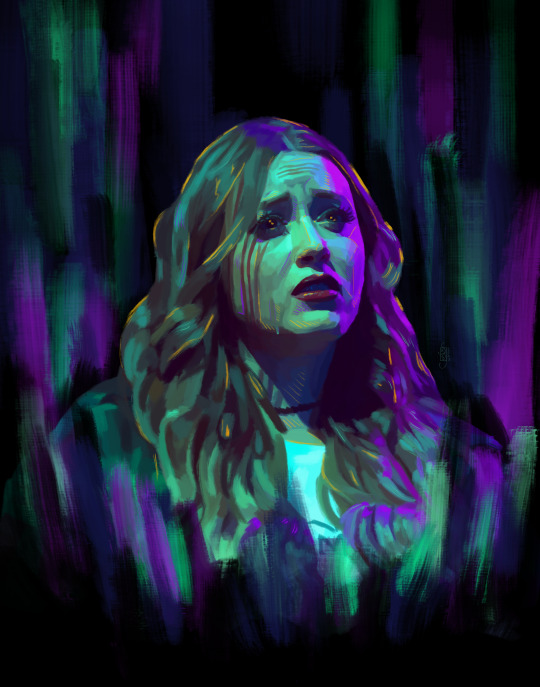
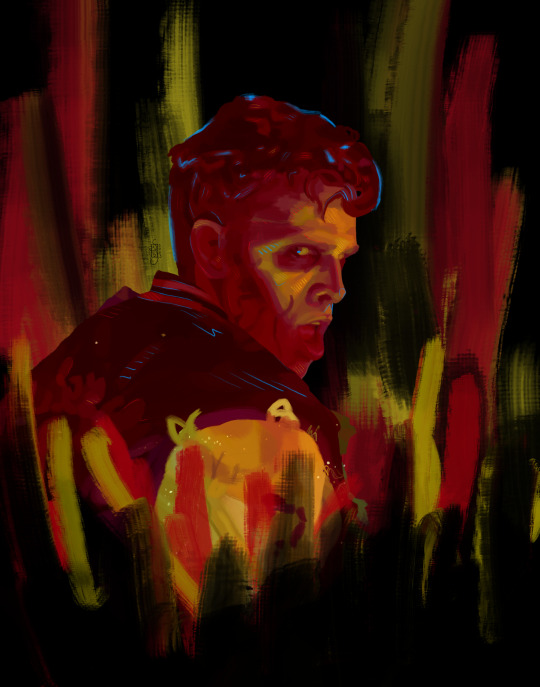

Darkness will spare my soul
Here's all my Nerdy Prude Must Die paintings in one set! These teens live rent free in my head for all eternity. I think i have the show memorized at this point for how much I watched it while doing these.
Yes I redid Richie's painting Don't look at me . (and shout out to @to-our-own-fairytale for the banger quote suggestion)
Edit: By popular demand, I have added these as prints to my store! Find them here!
3K notes
·
View notes
Text



"After all, they are still Von Zarovich."
Another art for the Raven's Inquisition campaign! This time celebrating the two Von Zarovich brothers and their individual plights.
In my prequel campaign I've had a blast expanding the story on the two brothers from the material in "I, Strahd". Both harbors their own brand of ferocity in this world's extended time of war. In the end, both sons of Barov, no matter how much they deny it.
586 notes
·
View notes
Text
absolutely obsessed with this concept and what I've seen executed. I NEED TO KNOW WHAT HAPPENS. PLEASEEEE
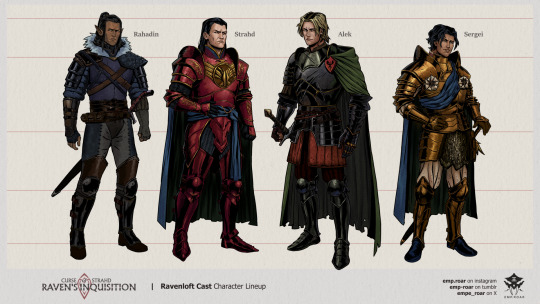
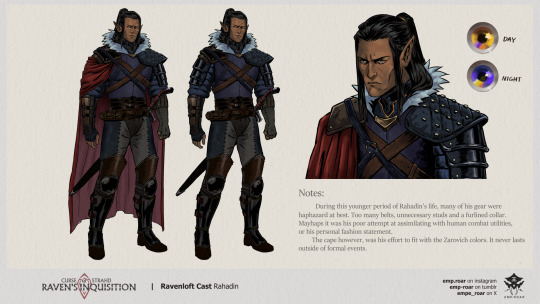
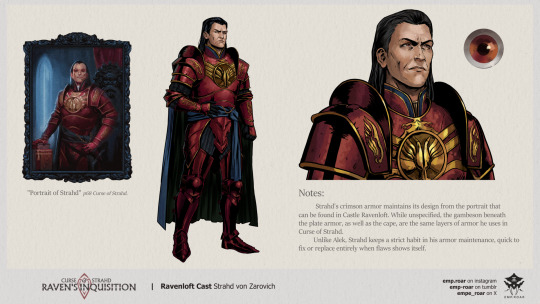
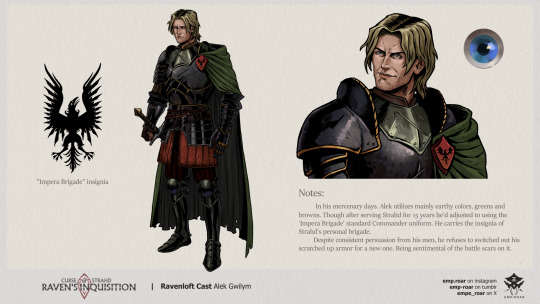
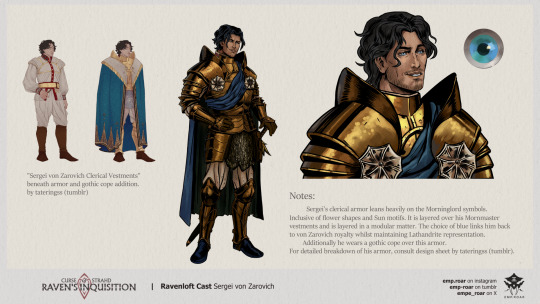
"MY ARMY SETTLED IN THE VALLEY
of Barovia and took power over the people in the name of a just god, but with none of a god's grace or justice." -- Tome of Strahd
"Raven's Inquisition" is a Curse of Strahd prequel campaign I am currently playing in where we get to explore setting elements and character relations that otherwise could not have been explored in the canon module. The DM @emp-roar (me) is constructing the campaign as an adaptation of the "I, Strahd" novel, where Barovia has yet been established, Strahd is still human, and the players are all inquisitors overtaking the Tsolenka Valley under the von Zarovich crest and the banner of the Morninglord.
Hi all! It has been a while since I've been on the internet, but I have since graduated and pursuing a career in animation! I was gifted the I,Strahd book during the middle of the pandemic and had been itching to run a prequel campaign based on an adapted take of I, Strahd, exploring elements that made Barovia and ultimately, Strahd, the way it became.
Hope you like the Ravenloft cast who the party had met. (Unironically this looks like a dating sim.)
Additionally the breakdown of Sergei's Vestments can be found in my player's @tateringss arsenal.
Impera Brigade insignia credit goes to ChiRHOKin I adored the shape of his alternative Barovia flag.
Strahd Portrait belongs to WOTC and the overall design and style was heavily inspired by Thronebreaker a Witcher's Tale!
And lastly!
SOL INVICTUS!
#strahd von zarovich#curse of strahd#strahd#ravenloft#dnd#dungeons and dragons#dnd art#forgotten realms#concept art#raven's inquisition#TELL MEEEEE
588 notes
·
View notes
Text
I, Strahd: a subversion of fantasy romance
There's so many ways to pick apart the book I, Strahd. It's a gold mine of essay-fodder.
But, here, I examine how Strahd+Tatyana's narrative flips fantasy romance tropes on their heads, and gives us a tragic critique on these tropes as a whole.
(If you want idea for narrative nuances to add to your games, you may especially want to take a peek.)
(If you simply also like Ravenloft lore and picking apart why Strahd is a hot mess, then you're in good company below.)
Imagine a paladin returning from war to the home town he’d fought to save. Imagine this paladin falling in love with a woman who represents the innocence and beauty he lost during his quest to save those he was sworn to protect. She is kind to the core, and still sees good, sees beauty, in a world the paladin thought broken long ago.
He falls for her, softens, and begins to dote on her. He brings her flowers on a summer’s eve and finds himself happy for the first time in so many years whenever she is near.
And yet- when time comes to ask for her courtship- he finds she has fallen for a man who has never seen the likes of war. A spoiled, naïve, fop.
(If this sounds like the plot of Pretty in Pink, then you’re spot on. That film also follows this trope to a tee.)
This is a tragedy to us, a study of man’s sacrifice being rejected. How, despite all he has given, he could not be happy in the end. Or, if our paladin, our hero, did “get the girl”, it’s seen as a love story. It shows how the paladin’s merit does get rewarded, how fulfilling his role nets him a happy ending.
I, Strahd: Memoirs of a Vampire by P.N. Elrod takes this trope, this literary perception, and gives us a very bleak (almost darkly satirical) spin.
Strahd (especially in the book) is not a likable person. He is blunt, empathetically deficient, perpetually irritable, and an all-around cynical grouch. And his tale is framed in the least flattering light imaginable; his own, very bitchy, words.
And this is where P.N. Elrod’s subversion of the narrative trope begins. Elrod has effectively taken away the familiar framework, shattered those rose-colored glasses. Instead of presenting us a third-person narrative of a palatably war-weary soul, she gives us this empathy-zero, paranoid, asshole who forgot how to smile ages ago. In essence, we got someone realistically fucked up.
Yet, we are still in the realm of fantasy. Of magic, monsters, demons, and happy endings. The character strives to make the same journey as his counterparts of similar worlds. He finds a girl who represents that innocence lost and seeks to win her heart.
Except, this is a story of twisted realism. Yes, the drive to follow such a narrative arc and conclude the happily ever after, or sanitized hero’s tragedy, reigns supreme. But the “hero’s” personality, his actions, and the fallout are not bound by any deus-ex-machina rose tinted pallatability.
A very real, flawed, person is made to follow the narrative, and fails, miserably. Not only fails, but leads to a cataclysmic disaster which effectively fucks over everything he’d spent a lifetime regaining and protecting.
I, Strahd shows us what actually happens when a man follows this narrative trope in high fantasy. It critiques the absurdity of thinking that such a mindset could bring a happy ending for any involved, or that the tragedy that ensues would be anything remotely close to romantic.
Strahd condemns the country he’d fought for to a hell of his own making. His quest to complete that destined arc leads to the brutal death of the woman, of the innocence, his narrative role says he’s supposed to claim. The tragedy that ensues isn’t the sanitized sorrow of similar tales, but years of deep depression and isolation. It’s not pretty. Not pretty at all.
And it’s uncomfortable, as readers, to watch unfold. Some are quick to remedy this tale with headcannons of the pair reuniting. Others quickly jump to sweeping condemnations of the idiot who got himself into this mess. Yet both of these are merely mental Band-Aids to try and reconcile the discomfort of watching a trope we should know, completely fall to ribbons.
I am not going to waste my breath with a lengthy disclaimer on how Strahd is an awful person and that I understand that. Because this “essay” isn’t about the nitty gritty of the fateful series of fuck-ups that gave us Ravenloft. This essay is a look at how tropes and narratives are subverted and picked apart by I, Strahd. So please, save your fingers, and keep critiques of me not tackling this- at bay. (In the future, I will possibly do an in-depth post examining his morality and culpability. But that post is not now.)
P.N. Elrod lays bare how flawed and, frankly, dangerous the narrative of male-centric works-righteousness romance is. The woman, the damsel, in the story is reduced to a cardboard cut-out by the narrative trope, and then brutally dies. The trope kills her, metaphorically, and pretty damn blatantly.
The man, the “hero”, in the story self-destructs and plunges himself into his own personal hell. The trope destroys him, also metaphorically and exceedingly blatantly.
It’s a heavy handed point to make, but the point hits home; the trope is lethal to women.
And it is also exceedingly damaging to men.
If the story ended there, with Strahd locked in eternal depression (or ending his life) surrounded by the shambles of his world, I, Strahd would still be a very poignant critique such fundamentally flawed romantic tropes…
But, it doesn’t end there. Instead, the cycle, the drive to complete this rose-tinted trope, begins anew. Tatyana reemerges, in different faces, different forms, lifetimes apart. He strives to either win her heart, or conclude his arc in a sanitized tragedy- for both paths will reach the same tropey conclusion we are supposed to see.
And he never does.
Unlike heroes in other tales of this sort, he’s realistically flawed and written to be an actual person. He’s not a knight in shining armor. He’s a cynical, empathy-deficient, introverted jackass. He’s cynical and empathy-deficient because he’s seen the worst mankind has to offer in war, and is realistically unpleasant because of that. He’s an introverted jackass because introverted jackasses exist. Because there’s no actual laws against introverted jackasses being stuck in such a narrative role.
(And may I say, it’s refreshing to see fellow introverted jackass representation)
The role of female cardboard cutout (sorry Tatyana) is a disservice to women and frankly dangerous if you think it over. But the role of paper mâché hero is what keeps the cycle going. If you make the cardboard a person in such a narrative, you get a skin-crawling horror story. If you make the paper mâché a person, you see a gut-wrenching cycle of personal agony. If you make both of them people, you see a horrifying, climactic, dystopian nightmare.
In this day and age, it is easier for an audience to quickly humanize the cardboard cut-out, especially for women/AFAB individuals. Reading I, Strahd with Tatyana’s perspective in mind is skin-crawlingly terrifying. And, even though Elrod is telling the tale from Strahd’s perspective, she does a good job of weaving in where Tatyana actually is mentally. Our looking glass is skewed by the narrative POV of paper mâché hero that we’re stuck in. But we can still hear the screams off-screen, so to speak. We can still see those brief glimpses of mannerisms and terror that us outsiders clearly interpret as a very real person stuck in a horror story. Tatyana, though she isn’t the focus of the tale, is a person.
What makes I, Strahd unique, however, is that Strahd is a person too. And, in all honesty, that’s not something we see very often. He’s not a sanitized and likable hero, but he’s also (let’s admit) not a completely despicable and bland “bad guy”.
Elrod makes both of them people, which brings a complete picture of a nightmare. A full critique of the dangers of such narratives in our modern tales. And we get to see the nightmare played over, and over, and over again.
I’ve steered away from using preachy or ‘political’ language thus far, but the crux of this “essay” does come down to a final point in that general area. Because art, more often than we’d care to admit, imitates life. Many stories we have told have been framed by the roles we are “supposed” to fill, and the arcs we are “supposed” to complete.
In the trope we examined today, male heroes are “supposed” to claim a woman, their ‘salvation’, and if rejected, are shown they will be reduced to ashes. Women are “supposed” to be innocent damsels and must embody innocence and salvation for the man and are terrible little fools if they turn the hero away. Assuming the narrative even gives the woman enough nuance to actually be semi-admonished by the audience for such a rejection.
P.N. Elrod shows us the realistic folly of such a trope to disastrous proportions. She takes this tropey daydream and makes us watch as her story reveals the nightmare for what it is; a cycle of horror, pain, and increasingly depressing journal entries.
(If you read this far, congratulations! Have a cookie 🍪
My quick final disclaimers, are that this is simply examining how tropes are used and subverted. I'm not getting into the personal morality of characters and their actions, nor am I condoning them. This is an overview, in the end, of narrative structure.
Also, I am writing this examination of mens roles in tropes as a queer afab person. I don't have a dog in this fight, so, supposedly that makes this vaguely more objective.
(For followers or folks who saw me around and then didn't for like 5 months- Hi, I'm alive! I just don't have time to write during the academic year.)
136 notes
·
View notes
Text





"MY ARMY SETTLED IN THE VALLEY
of Barovia and took power over the people in the name of a just god, but with none of a god's grace or justice." -- Tome of Strahd
"Raven's Inquisition" is a Curse of Strahd prequel campaign I am currently playing in where we get to explore setting elements and character relations that otherwise could not have been explored in the canon module. The DM @emp-roar (me) is constructing the campaign as an adaptation of the "I, Strahd" novel, where Barovia has yet been established, Strahd is still human, and the players are all inquisitors overtaking the Tsolenka Valley under the von Zarovich crest and the banner of the Morninglord.
Hi all! It has been a while since I've been on the internet, but I have since graduated and pursuing a career in animation! I was gifted the I,Strahd book during the middle of the pandemic and had been itching to run a prequel campaign based on an adapted take of I, Strahd, exploring elements that made Barovia and ultimately, Strahd, the way it became.
Hope you like the Ravenloft cast who the party had met. (Unironically this looks like a dating sim.)
Additionally the breakdown of Sergei's Vestments can be found in my player's @tateringss arsenal.
Impera Brigade insignia credit goes to ChiRHOKin I adored the shape of his alternative Barovia flag.
Strahd Portrait belongs to WOTC and the overall design and style was heavily inspired by Thronebreaker a Witcher's Tale!
And lastly!
SOL INVICTUS!
588 notes
·
View notes
Text
to succeed in adult friendship you must remember the key tenets of child friendship:
Play Toys
Play Pretend
Snack Time
74K notes
·
View notes
Text
consider: teenagers aren’t apathetic about everything they’re just used to you shitting all over whatever they show excitement about
400K notes
·
View notes
Text
You should be starting a recipe book. I don't give a shit if you're only 20-years-old. The modern web is rotting away bit by bit before our very eyes. You have no idea when that indie mom blog is going down or when Pinterest will remove that recipe. Copy it down in a notebook, physically or digitally. Save it somewhere only you can remove it. Trust me, looking for a recipe only to find out it's been wiped off the internet is so fucking sad. I've learned my lesson one too many times.
71K notes
·
View notes
Text
im thinking over and over again abt micah and cayde and damn,, that entry where she found her human memory brain scan is fucking me up.
she knew cayde for so long, even before he was vanguard, even before andal was vanguard probably! and he knew her, he knew all his hunters very well, as he said "you must know your hunters!" "watch everyone's back". with her ghost caring gig she was known and he was a leader so everyone knew him.. and…. they were just living like that, having no idea who they are to eachother. cayde was literally building significant chunk of his entire identity around a vague memory of her. and then when he died, one of last things he hoped for right before was to see her again.
and only couple of years later when crypt got discovered she realised who he, the guy who was there all along for all these decades, if not centuries, was. and that he was the person who "saved her". from boredom, from isolation, from how much exoprogram broke her family and from crisis of identity. he was her home and she was his.
they were family and they didnt realise that in time and she was left alone with that knowledge. she could perhaps share this information with mihaylova but does it make it any better? it was only relevant for her and cayde, who died tragically never knowing what he did for her and she was stuck unable to ever thank him. and he could never learn that his ace wasnt just a coping mechanism made up by breaking, desperate mind of suffering, lonely exo, but that she was real. ace is real, alive, well, smart, compassionate, helpful, and loves him. and misses him. and she maybe wouldnt be any of it all, maybe she wouldnt even be here if not for him.
crow's accidental wish gave cayde back to us and gave him a chance to apologize but the longer i think about it the more i feel like it was even a bigger blessing for micah than it could ever be for us. she finally had a chance to get it off her chest, and, if we assume she told cayde all of it, it was a blessing for him too. how validating it must have felt to learn that presumed falsehood (as is the case with maya) you chose to believe, used to build a better you, treasured and called upon in your last moments is real after all? not only that but feelings are mutual.
since ghost quests happen about 3 days before alliance attack and micah together with cayde left the comms several times to have private conversations i chose to believe they had this talk. i could not imagine a more complete ending for cayde than learning that ace was and is real and better resolution to this situation for micah than taking this weight off her shoulders.
excuse me i need to cry.. ♤
184 notes
·
View notes
Text
The cultural impact of “boomer” as a pejorative has been disastrous and I’m not even kidding
83K notes
·
View notes


